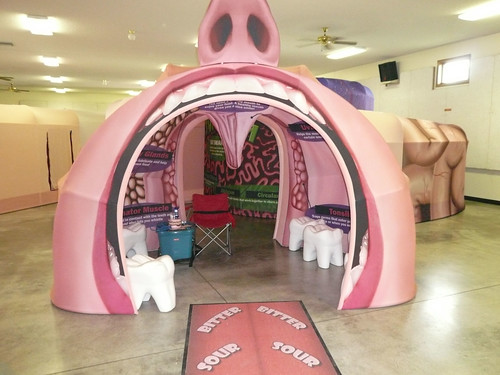Schools are successfully serving more nutritious meals to America's students, and healthier meals mean healthier kids. USDA is constantly working to do everything we can to support school nutrition professionals as they work to provide kids the nutrition they need to learn and develop into healthy adults. To further assist schools, USDA announced the availability of up to $5.5 million in Team Nutrition training grants for states for Fiscal Year (FY) 2015. These grants focus on the implementation of Smarter Lunchrooms - an innovative strategy using behavioral economics to encourage healthy eating in the cafeteria - as well as the healthier meal standards, HealthierUS School Challenge (HUSSC), USDA Foods, nutrition education, and wellness activities in schools and child care institutions. To apply for the grants, state agencies should visit www.grants.gov.
Here are some examples of how Team Nutrition grants have helped schools in the past:

Alicia Dill, Nutrition Education Consultant with the Wisconsin Department of Public Instruction
Team Nutrition Training Grants have allowed Wisconsin Team Nutrition to expand our nutrition education efforts in order to reach tens of thousands of students across the state. Since 2010, our nutrition education activities have placed an emphasis on incorporating gardening and the use of local foods into school and child care curriculum. Statewide culinary competitions have been held to provide education surrounding local foods and the development of culinary skills.
Additionally, funding has been provided to childcare and school sites to initiate gardening activities, conduct taste tests of local foods, and incorporate Team Nutrition developed nutrition education curriculum. Participating students have gained the knowledge and skills to produce and prepare foods and have shown an increased willingness to try fruits and vegetables. Nutrition education curriculum, taste testing materials, and a school gardening best practice guide have been created thanks to funding provided through the Team Nutrition Training grants.

Jenny Edmondson, Public Health Nutrition Consultant with the Pennsylvania Department of Education
Pennsylvania has had 12 USDA Team Nutrition grants. Each project has been implemented through Project PA, a collaboration between the Pennsylvania Department of Education, Division of Food, and Nutrition, and Penn State University.
Projects have employed a variety of training strategies including video and print material development, conference and workshop presentations, school mini-grants, webinars, collection and dissemination of promising practices, and on-line module development. Projects have reached a variety of audiences including school food service employees, school administrators, parents, and students. The overall goal has been to help schools establish healthier nutrition environments.
Our most recently-completed project was a 2011 Team Nutrition grant. Through that project, we trained more than 1,200 school food service employees on meal pattern requirements and developed on-line training resources that were accessed more than 200 times during the timeframe of the grant. Those resources continue to be available, providing sustainability for the education provided. In addition, 27 schools representing nine school districts received HUSSC awards during the timeframe of the grant project.

Jill Ladd RD, Team Nutrition and ART II Project Director with Kansas State Department of Education
As part of the FY 2012 Team Nutrition Training grants, Kansas State Department of Education and nearly 17,000 students in grades K-5 participated in the 8-week Power Panther Pals nutrition education curriculum developed by Kansas Team Nutrition. As part of the lesson, students participated in cooking/tasting activities and received a student activity booklet with recipes and weekly activities.
Also, as part of the FY 2012 grants and partnership with the Kansas Health Foundation, Kansas reached over 17,600 secondary students through a Fresh Fruit and Vegetable Program for Secondary Schools. Based on results from the pre and post surveys completed by participating students, 40.9 percent of students stated that their family has begun buying/eating more fruits and vegetables after participating in the program. A quote from a participating school revealed that, “The students were very excited about trying new foods and were very receptive to the program. At the end of the four weeks, the majority of students said they had their parents buy at least one of the fruits and vegetables we had tried to eat at home, and about half had tried the recipes we provided at home. I was also told by the produce manager at our local grocery store that he ran out of mangoes for two weeks after we featured it in the program.” – USD 113 Prairie Hills, Sabetha Middle School. As part of the program, 12 one-page nutrition education tip-sheets for fresh fruits and vegetables were developed and can be accessed at http://www.kn-eat.org/SNP/SNP_Docs/SNP_Guidance/FS_Facts_PDF_Forms/Chpt_32_NutritionEducationTipSheetsFFVP-SS.pdf.

Carrie Scheidel, Team Nutrition Co-Director with the Iowa Department of Education
The Iowa Department of Education’s Team Nutrition Program partnered with the University of Iowa Public Policy Center to address school breakfast participation among Iowa teens. To best address this issue, high school students from across the state were included in the project. These students identified barriers, motivators, and benefits to eating school breakfast which resulted in the development of two resources.
- Twitter Toolkit: provides food service directors, cafeteria workers, and school administrators with information and resources to develop and manage their own Twitter account, including how to set up an account, how to develop messages, what to tweet about, and how to increase your followers.
- Best Practice Guide: offers the student perspective on practices related to school breakfast and provides solutions to common school breakfast challenges including: awareness, competing priorities, timing, location, food preferences, and misconceptions.
Iowa Team Nutrition also partnered with the Academy of Nutrition and Dietetics Foundation to develop workshops for parents to empower them with information about school meals and school wellness. They are designed to be co-led by a registered dietitian nutritionist and the food service director. The developed materials have been piloted in 15 Iowa schools and include a leader guide, handouts, and a myth and fact activity.
